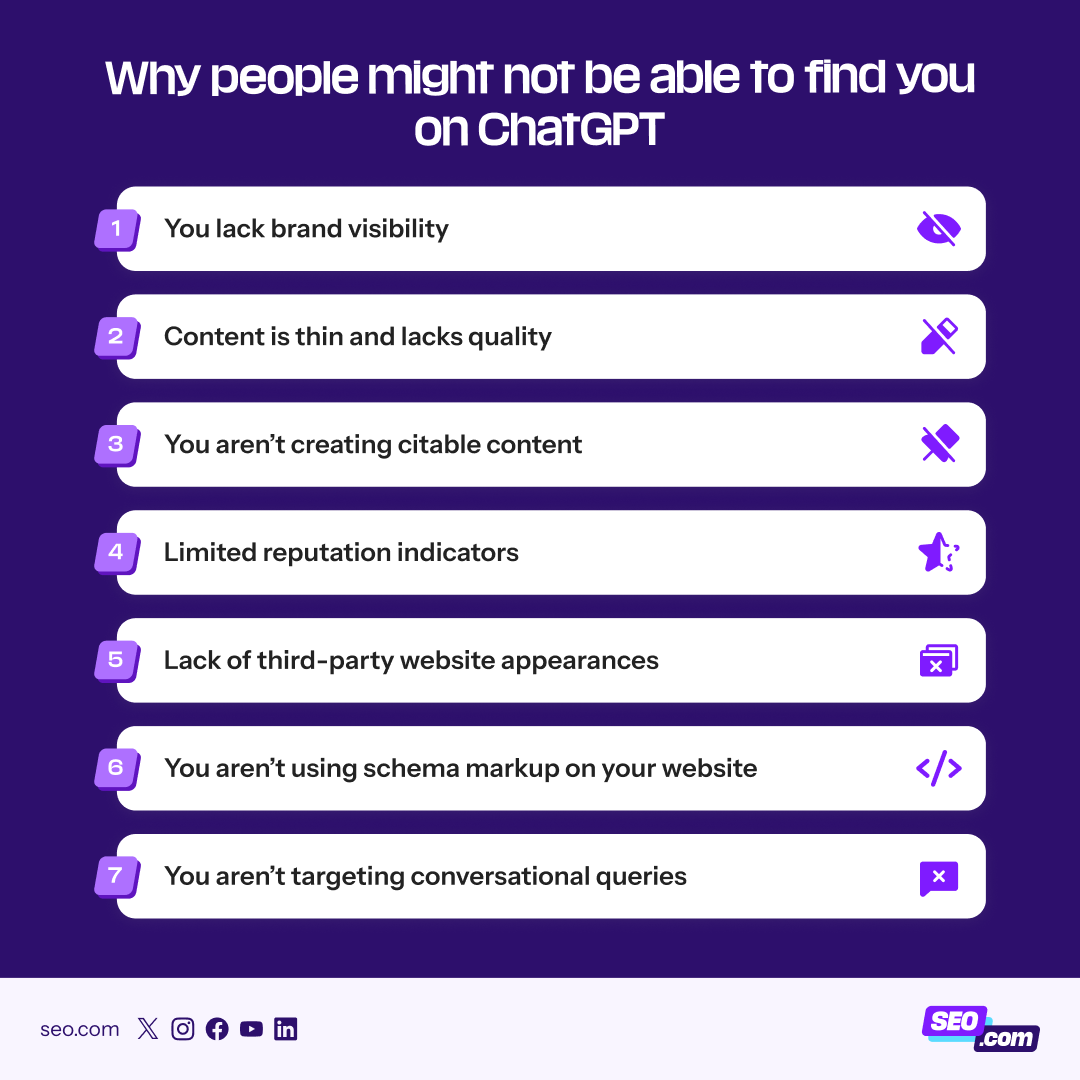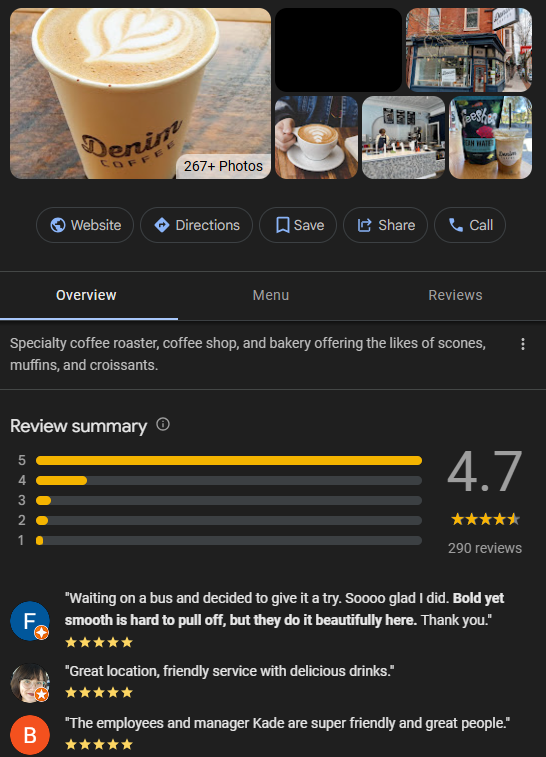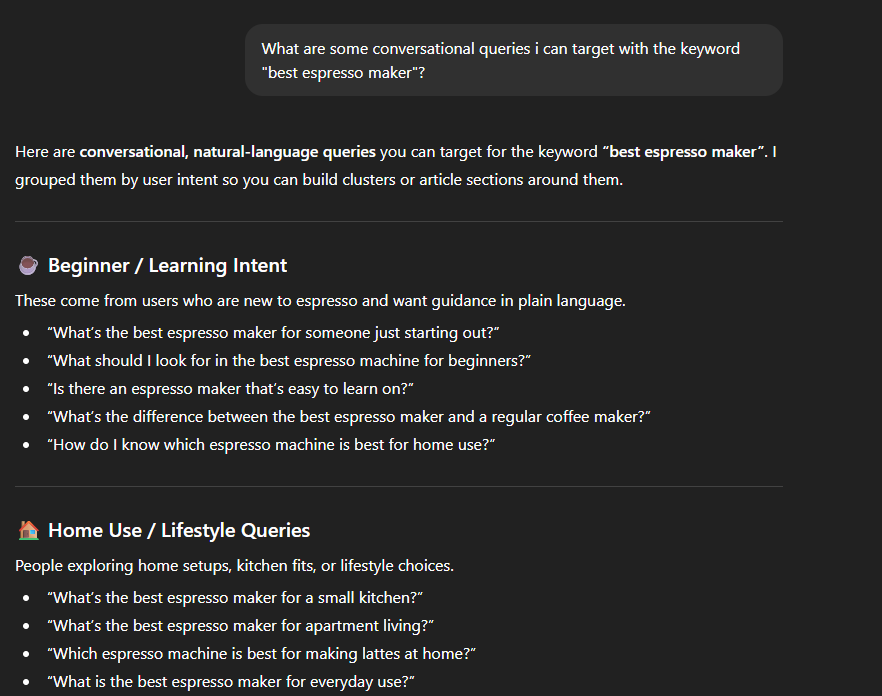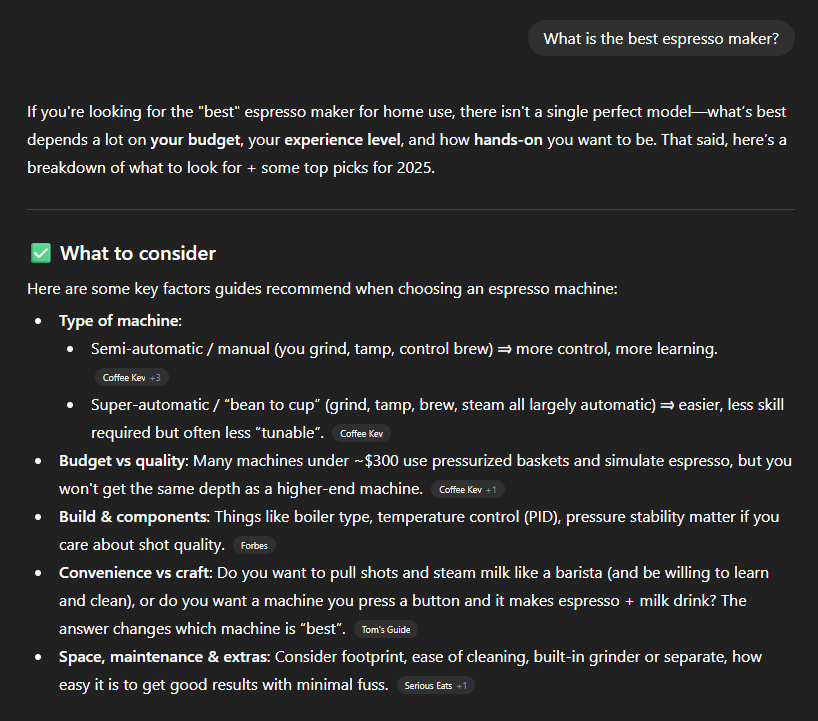- Why is ChatGPT visibility important for businesses? Over 700 million people use ChatGPT weekly to research products and services, particularly during early stages of the buyer’s journey, making it crucial for brands to appear in responses to build recognition and influence future purchase decisions.
- What prevents brands from appearing in ChatGPT results? Common barriers include lack of brand visibility across the web, thin or low-quality content, absence of schema markup, limited reputation indicators like reviews and backlinks, and failure to target conversational queries instead of traditional keywords.
- How does ChatGPT determine which sources to cite? ChatGPT pulls information from its training database and the web through retrieval-augmented generation (RAG), typically citing sources for queries involving data/statistics, niche topics, fresh information, and YMYL (Your Money or Your Life) subjects that require credibility.
- What type of content gets cited most often? Content containing specific data and statistics, covering specialized or niche topics, providing current/time-sensitive information, or addressing financial, medical, and legal topics tends to receive citations because ChatGPT seeks authoritative sources for these queries.
- How can businesses improve their ChatGPT visibility? Build brand mentions across third-party websites, create high-quality citable content, add relevant schema markup, earn backlinks and reviews to boost reputation, target conversational queries instead of keywords, and use tools like OmniSEO® to track performance across LLMs.
While ChatGPT isn’t taking over Google anytime soon, it’s still growing into a place where people get information as they go through the customer journey. And with this growth, you’re likely wondering: Are people finding you on ChatGPT?
I can help you figure it out. I’ll go over information like:
- Why You Need to Be Visible on ChatGPT
- How Do People Search Using ChatGPT
- Why People Might Not Be Able to Find You on ChatGPT
- How to See if People Are Finding You on ChatGPT
Why you need to be visible on ChatGPT
You need to be visible on ChatGPT because people are actively using this platform. Over 700 million people use ChatGPT each week to get information, ask questions, and explore products or services.
Even though Google still reigns supreme, people are turning to platforms like ChatGPT to help supplement their research process.
While people use ChatGPT at all stages of the buyer’s journey, a lot of them are using it at the beginning, where they’re just exploring and looking for information. They’re searching more top of the funnel queries like “how do I build a retirement portfolio?” or “why is eco-friendly packaging better?”
It’s crucial that you’re visible in ChatGPT so when users start their journey, they’re exposed to your brand early and can build brand recognition with your company.
As they move down the funnel, they remember your brand, and they’re familiar with it, so they’re more likely to choose you once they’re ready to make a decision.
Overall, building visibility in ChatGPT is crucial if you want to ensure that you’re reaching your audience at all different touchpoints in the buyer’s journey.
How do people search using ChatGPT
Before you can get found on ChatGPT, it’s important to understand how people search on the platform.
Here are some common use cases for searching on ChatGPT:
- Looking for general information about a topic or query
- Seeking a solution for a known problem
- Looking for recommendations for a product or service
- Comparing multiple products or services to find the best one
- Searching for a local business in their area
- Trying to find the best of something (the best business, product, approach, etc.)
The list isn’t limited to the items above, but it is some of the common approaches that people take when using ChatGPT to get information. It can help you shape your content and the way you approach sharing information.
Why people might not be able to find you on ChatGPT

Are you worried that people can’t find you on ChatGPT? Here are some common reasons why people may not be able to find you and what you can do to fix it:
- Reason #1: You Lack Brand Visibility
- Reason #2: Content is Thin and Lacks Quality
- Reason #3: You Aren’t Creating Citable Content
- Reason #4: Limited Reputation Indicators
- Reason #5: Lack of Third-party Website Appearances
- Reason #6: You Aren’t Using Schema Markup on Your Website
- Reason #7: You Aren’t Targeting Conversational Queries
Reason #1: You lack brand visibility
One of the most common causes for people not finding you on ChatGPT is lacking brand visibility.
Unlike traditional search engines, LLMs like ChatGPT take brand visibility into account. If your brand is visible throughout the web, it means that you’re well known and trusted, which makes ChatGPT more likely to pull you into responses and cite you.
If you don’t have a strong online presence outside of your website, you’re less likely to get pulled into responses, which means that people won’t see your brand.
LLMs like ChatGPT take brand visibility into account. The more visible your brand is online, the more likely you are to get pulled into the responses. If you don’t have a strong online presence, you’re less likely to get pulled into ChatGPT’s responses, which means you’ll lack brand visibility for searchers.
Solution: Work on building your brand visibility across the web
If you want to improve your brand visibility on ChatGPT, you’ll need to start building mentions of your brand across the web. But how do you do that?
There are a couple of methods you can use to help increase your brand mentions, including:
- Creating high-quality content that earns backlinks
- Getting your brand’s name mentioned on third-party aggregate websites
- Guest blogging on a third-party website
- Collaborating with brands and co-marketing on your and their website
Reason #2: Content is thin and lacks quality
If you feel like people aren’t finding you on ChatGPT, it might be because of your content. If your content is thin, lacks quality, or is generally very “basic,” LLMs like ChatGPT have no reason to cite you. As a result, you won’t appear in search responses.
The quality of your content is crucial for appearing in responses. ChatGPT only wants to deliver highly-relevant, informative, and helpful content to searchers. You need to ensure that your content is of value and helpful to your audience, so you can appear in the results.
Solution: Boost the quality of your content
The solution for this problem is simple: Boost the quality of your content.
Don’t create content that’s surface-level and doesn’t really go into detail about whatever topic you’re writing about. Instead, focus on diving in deeper and giving people more information that you think will be helpful for them to know.
Keep in mind that you need to strike a balance between going too in-depth and not providing enough detail. Think about your audience and what information they’d want to know most, and how much they’d want to know. Focus more on the quality and value of your content, rather than having content just to have it.
Reason #3: You aren’t creating citable content
Are people finding you in ChatGPT? If you aren’t creating citable content, then probably not.
Citations in ChatGPT are one of the best ways for people to find your brand when they’re searching through the platform. While ChatGPT doesn’t always cite in its responses, when it does, it gives people a direct line to your website.
But, if you aren’t creating content that’s likely to get cited, you aren’t going to appear in those responses.
Solution: Create content for citable queries
So, how can you effectively create content that’s likely to be cited? First, it’s important to understand how LLMs, like ChatGPT, work. These LLMs pool their knowledge from two different sources:
- Training data: This is all the built-in knowledge that ChatGPT has within its database. Information that’s included in here doesn’t get cited as often because it’s already built into the platform.
- The web: This process is known as retrieval-augmented generation (RAG). If someone conducts a query for information that is outside of ChatGPT’s database, it will do a quick search on the web and pull the information from what’s ranking in search results.
Typically, a query that uses RAG is the one that produces citations. That doesn’t mean that queries that use the training database won’t have citations, but it’s less likely.
Certain types of queries tend to trigger a cited response, including:
- Data or statistics: If someone is looking for specific numbers or statistics, it will result in a cited response.
- Niche or specialized topics: LLMs like ChatGPT tend to train on more common or broader topics. So if someone is searching for something niche or specialized, it may result in a web search from ChatGPT that leads to citations.
- Queries in need of fresh information. This includes queries that ask for current events information, pricing, or anything else that’s time-sensitive.
- Your Money or Your Life topics: YMYL topics like financial guidance, medical advice, and legal information have real-world impacts on people, which is why the information is often cited by ChatGPT, to ensure credibility of the responses.
So, if you want to try and boost your citations, considering adding relevant data to your pages or creating blog posts on niche topics in your industry.
Reason #4: Limited reputation indicators
If people aren’t finding you on ChatGPT, it might be because you have limited reputation indicators.
As I mentioned earlier, LLMs like ChatGPT want to deliver information from high-value, authoritative sources. The way that it determines the authority of a source is based on reputation indicators like reviews and backlinks.
If you’re falling short when it comes to reputation indicators, people aren’t going to find you in their ChatGPT responses.
Solution: Boost your online reputation
The solution for this one is simple: spend some time boosting your online reputation.
One area where you can improve your reputation is reviews. Work on getting more reviews on your local business profiles like your Google Business Profile, Yelp, and others.

You can also work on adding reviews to your website to further enhance your reputation.
On top of that, earning backlinks is a good way to improve your reputation. If high authority websites are linking to your pages, it sends a signal that you are reputable and a trustworthy source of information.
By earning backlinks from authoritative sources in your industry, you can help enhance your online reputation.
Reason #5: Lack of third-party website appearances
If you aren’t appearing on third-party websites, people likely won’t be able to find you on ChatGPT. I mentioned this a little bit earlier when talking about visibility, but a key component to you appearing in ChatGPT responses is being visible across the web.
Part of that visibility is you appearing on third-party websites. So while your website is a crucial and valuable place for building your brand reputation, it can’t be the only place your brand lives if you want to get cited in LLMs like ChatGPT.
You need your brand to appear across different third-party websites because it helps signal that other websites or brands see you as trustworthy and authoritative. Basically, you can’t self-endorse — you need other websites to endorse you as an authoritative source.
Solution: Find third-party appearance opportunities
If you want to get endorsements from third-party websites, you need to first find opportunities where you can get them.
You can try looking at aggregator websites that list “the top XYZ brand” or “the best XYZ product” within your industry and see if you can get mentioned on the list.
You can also try a strategy like guest blogging, where you create content for another website with links leading back to your own site.
Additionally, just creating high-quality content can help you earn mentions within other people’s content and links back to your pages.
Reason #6: You aren’t using schema markup on your website
Are people finding you on ChatGPT? Not if you aren’t using schema markup on your website.
Schema markup (also known as structured data) is a way for you to tell LLMs like ChatGPT what’s on your website. It’s basically information written in a language that LLMs understand that helps them get the context of what’s on your page.
Adding schema markup helps these LLMs better understand your content so that it can cite you when appropriate. Without schema, you’re relying on the LLMs to scan your pages and hopefully understand the context of them in order to cite you in relevant search results.
Solution: Add schema markup to your pages
The solution to this one is pretty simple: Just add relevant schema markup to your pages to help provide ChatGPT with context.
What schema markup you add depends upon the type of page and what information is included on the page. Here are some of the most popular schema options that people add to their website:
- FAQ
- HowTo
- LocalBusiness
- ItemList
- Product
- Service
- Article
- Organization
You can use a schema markup tool to help you create your schema, or rely on ChatGPT to generate it for you. Just make sure that you test it first with a schema validator to ensure that it’s accurate.
Reason #7: You aren’t targeting conversational queries
If people aren’t finding you on ChatGPT, it might be because you’re not targeting conversational queries. Many businesses are making the mistake of just targeting keywords, like they do with traditional search engines.
The reality is, though, that when people search on ChatGPT, they’re searching more with conversational prompts vs. short phrases.
So, for example, on a search engine like Google, someone might search “best espresso maker.” On a platform like ChatGPT, though, they’re more likely to search “What is the best espresso maker?” or “Who makes the best espresso maker?”
If you want people to find you on ChatGPT, you need to target conversational queries to appear in the responses.
Solution: Identify and target conversational queries
If you want people to find you on ChatGPT, you need to identify and target conversational queries that you can incorporate within your content.
The easiest way to do this is to put your core keyword into ChatGPT and ask it for conversational queries that you can target related to that keyword. It will give you a whole list of options to choose from, and you can integrate those conversational phrases into your page.

How to see if people are finding you on ChatGPT
Curious if people are finding you on ChatGPT? One way you can do this is by searching the conversational queries related to your keywords and seeing if you are cited in the response.
So, let’s go back to the “best espresso maker” example. If we search the conversational phrase “What is the best espresso maker?” on ChatGPT, we can see who’s cited in the responses.

You can manually search all the conversational phrases you’re targeting and then look through the response to see if you’re mentioned or cited.
If you don’t want to have to manually explore this information, you can use a tool like OmniSEO® to track these conversational queries across ChatGPT and other LLMs to see where you’re appearing, if your competitors appear, and more.
Help more people find you on ChatGPT
Are people finding you on ChatGPT? They will, with the help of our experts at WebFX (the team behind SEO.com). With our GEO services, we can help you boost your visibility in ChatGPT, Perplexity, and more! Connect with us today to see how we can help you do it!

Grow Your Visibility Beyond Google
Capture leads and traffic from emerging search platforms like ChatGPT, Perplexity, and Google AI.



Grow Your Visibility Beyond Google
Capture leads and traffic from emerging search platforms like ChatGPT, Perplexity, and Google AI.
Table of Contents
- Why You Need to Be Visible on ChatGPT
- How Do People Search Using ChatGPT
- Why People Might Not Be Able to Find You on ChatGPT
- Reason #1: You Lack Brand Visibility
- Reason #2: Content is Thin and Lacks Quality
- Reason #3: You Aren’t Creating Citable Content
- Reason #4: Limited Reputation Indicators
- Reason #5: Lack of Third-party Website Appearances
- Reason #6: You Aren’t Using Schema Markup on Your Website
- Reason #7: You Aren’t Targeting Conversational Queries
- How to See if People Are Finding You on ChatGPT

Grow Your Visibility Beyond Google
Capture leads and traffic from emerging search platforms like ChatGPT, Perplexity, and Google AI.
Writers

What to read next
- Feb 19, 2026
- 8 min. read
- Feb 18, 2026
- 8 min. read


